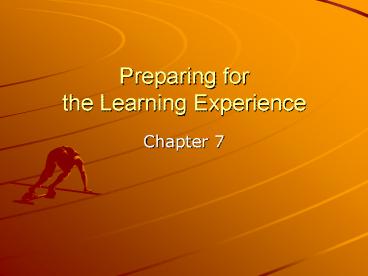Preparing for the Learning Experience PowerPoint PPT Presentation
1 / 24
Title: Preparing for the Learning Experience
1
Preparing for the Learning Experience
- Chapter 7
2
Objectives
- Discuss the concept of the learning experience
- Explain the role of the movement practitioner in
defining learning experiences - Describe several learner characteristics of which
practitioners should be aware
(continued)
3
Objectives (continued)
- Explain how movement practitioners can evaluate
the progress of learners - Assist someone in developing a blueprint for a
motor learning experience
4
Preview
- In Lewis Carrolls classic childrens story
Alices Adventures in Wonderland, Alice and the
Cheshire cat have the following exchange
(continued)
5
Preview (continued)
- Alice Could you tell me which way I should go
from here? - Cheshire cat Well, that depends a good deal on
where you want to go. - Alice Oh, I dont much care where.
- Cheshire cat Then it doesnt matter which way
you go.
(continued)
6
Preview (continued)
- Does it matter which way you go?
- Why do you go where you go?
- What does it take to get there?
7
Overview
- Concept of learning experience and some of the
factors that movement practitioners consider when
preparing to assist learners - Goal setting
- Transfer of learning
- Learner characteristics
- Performance assessment
- Conceptualizing learning using everyday conditions
8
Goal Setting
- Set targets for performance improvement
- Encourage all learners to set goals
- Know what the learners goals are
- Individualize goals
- Make sure people have a vested interest in goal
setting
(continued)
9
Goal Setting (continued)
- Understanding the purpose of specific activities
- Challenging, measurable, achievable, realistic,
specific, and beneficial goals - Performance-based goals
- Sufficient time to accomplish a goal
- Proper apparatus
10
Types of Goals
- Outcome goals target performance improvements
that focus on the result of the activity (winning
a tennis match). - Performance goals focus on improving on a
previous performance (improving percentage of
good first serves). - Process goals target the quality of movement and
skill execution (tucking body during forward
roll).
11
Targeted Goals
- Target skills are the skills a person wants to be
able to perform. - Target behaviors are the actions a person needs
to be able to produce to accomplish target
skills. - Target context is the environment in which the
person will produce the target skill.
12
Locus of Control
- A persons perception of who or what controls
what happens to him or her - Internal vs. external
- Stable vs. unstable
13
Transfer of Learning
- The gain or loss of a persons proficiency on one
task as a result of previous experience - What a person learns during practice vs. what he
or she can do in the target context
(continued)
14
Transfer of Learning (continued)
- Generalization is the transfer of learning that
occurs from practice to target context (piano
recital). - Near transfer is the type of learning that
transfers from one task to another under very
similar tasks or situations. - Far transfer occurs from one task to another
under very different tasks or settings.
15
Motivation
- Motivatedpractice longer, more dedicated, more
conscientious - Not motivatedhalf-hearted efforts
- Achievement motivationthe effort a person uses
to reach a goal for mastery, for learning, or to
surpass others - Must see the relevance to be motivated to perform
specific tasks
16
Past Experience
- Tasks that share many similar elements are
expected to transfer to a greater extent than
those that do not. - Movement elements are motor patterns associated
with correct performance. - Perceptual elements are task-related stimuli that
people interpret for successful performance.
(continued)
17
Past Experience (continued)
- Conceptual elements are similar strategies, rules
critical to performance. - Specificity of learning holds that the more
similar the movement components and environmental
conditions to the target skill, the better the
learning experience.
18
Stages of Learning
- Verbalcognitive stage
- Motor stage
- Autonomous stage
19
VerbalCognitive Stage
- A lot of time talking
- A lot of time thinking
- Self-talk
- Verbal guidance
- Large gains
- Rapid gains
20
Motor Stage
- Solved cognitive problem
- Refining skill
- More effective movement
- More consistency
- Strategies
- Need precise feedback
21
Autonomous Stage
- Some never get here
- Little or no attention
- Longer motor programs
- Higher-order cognition
22
Valid Indicators to Assess Skills
- Outcome measures are performance observations
that indicate some aspect of the result as it
relates to time, distance, frequency, and
accuracy. - Process measures indicate something about the
quality of movement being produced.
23
Error Measures
- Constant error is the measure of a persons
deviation from a target with respect to the
amount and direction. - Variable error is the inconsistency of results of
several movements with respect to the average
constant error of the movement.
24
Observable Products of Learning
- Knowledge of concepts
- Control and coordination
- Muscles used
- Movement efficiency
- Attention
- Error detection and correction

